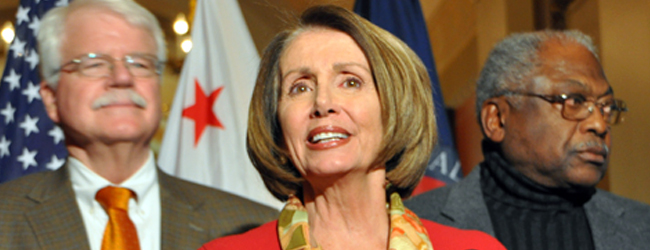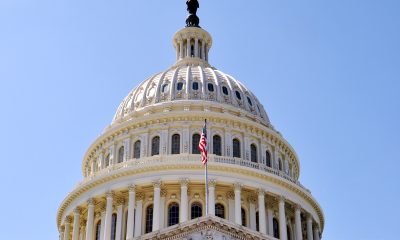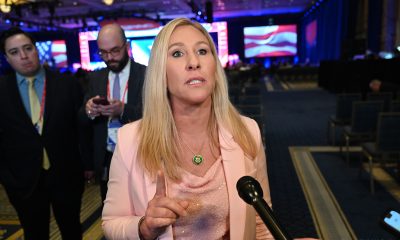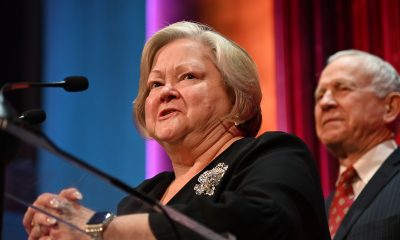National
Gay lawmakers back Pelosi’s leadership bid
But some advocates unhappy with decision to pursue post

U.S. House Speaker Nancy Pelosi’s (D-Calif.) decision to pursue a bid as minority leader in the upcoming Congress is being met with unanimous support among the openly gay members of Congress as some LGBT advocates expressed regret that more pro-gay legislation didn’t pass during her tenure as presiding officer.
After Pelosi announced her decision to run for House minority leader last week, openly gay members of Congress declared their support for her decision and praised her work representing San Francisco in Congress for 23 years and her work in the last four years as speaker.
Rep. Tammy Baldwin (D-Wis.), the only out lesbian in Congress, said in a statement to the Blade that she’s among those endorsing Pelosi in her decision to become Democratic leader in the next Congress.
“I remain loyal to Nancy Pelosi,” Baldwin said. “In the last two years, she accomplished things that we’ve been trying to do for decades. Without her unique leadership passing health care reform, [the stimulus package], higher education reform, Wall Street reform, the Matthew Shepard Hate Crimes Act, and the House-passed Energy and Climate Change bill would never have happened.”
In an interview with the Washington Blade on Monday, Rep. Barney Frank (D-Mass.), the longest-serving openly gay member of Congress, also said he backs Pelosi’s decision to stay on as Democratic leader. He’s often spoken highly of her commitment to LGBT issues.
“I’m supporting her; I think she’ll win,” Frank told the Blade.
Also among those expressing support for Pelosi’s continued leadership is Rep. Jared Polis (D-Colo.), a gay lawmaker who last week issued a statement praising Pelosi’s decision and her support for the LGBT community.
“I strongly support the speaker and her decision to run for Democratic leader,” Polis said. “She has been a longstanding and ardent supporter of the LGBT community and I will do anything to help continue her leadership. The speaker has led the Democrats out of the wilderness before and I am confident she can do it again.”
David Cicilline, the Rhode Island politician who last week was elected to become the fourth openly gay member of Congress, also endorses Pelosi’s move. Richard Luchette, a spokesperson for Cicilline, said the congressman-elect “will be supporting Nancy Pelosi for minority leader.”
During the course of her tenure as speaker since 2007, Pelosi has pushed through a number of pro-LGBT bills through the U.S. House. The chamber passed hate crimes protections legislation in 2007 and again in 2009.
Pelosi also mustered enough votes in 2007 to pass through the House a version of the Employment Non-Discrimination Act that later died. This year, a measure that would lead to “Don’t Ask, Don’t Tell” repeal passed the House by a 40-vote majority.
The health care reform legislation that Pelosi dragged to the finish line earlier this year increases access to Medicaid for people with HIV and improves Medicare Part D by closing the “donut-hole” for people participating in AIDS Drug Assistance Programs. Additionally, the law prohibits insurance companies from discriminating based on pre-existing conditions, such as HIV status.
But despite Pelosi’s success in the House with pro-LGBT legislation, only hate crimes legislation also successfully passed through the Senate during her time as speaker. Additionally, Pelosi has endured criticism for not moving forward with a trans-inclusive ENDA during the 111th Congress.
Drew Hammill, who’s gay and a Pelosi spokesperson, said the California lawmaker has been “a staunch advocate” for LGBT people during her more than 20 year in Congress. Among the positions she’s taken that he cited are leading the fight against HIV/AIDS, opposing a U.S. constitutional amendment banning same-sex marriage and speaking out against Proposition 8 in California.
“Nancy Pelosi will continue to be a friend, advocate and staunch ally to the community and the leading voice in the Congress for LGBT equality,” Hammill said.
House Democrats will vote at the start of the lame duck session next week on who will become minority leader in the 112th Congress as well as which members will assume other positions in Democratic leadership. As of Blade deadline, no other House member has challenged Pelosi in her bid to become Democratic leader.
The more contentious battle will likely be over who will take the No. 2 position in the Democratic caucus. Both current House Majority Leader Steny Hoyer (D-Md.) and House Majority Whip Jim Clyburn (D-S.C.) are vying to become House minority whip. Hoyer is expected to have the backing of more moderate members of Congress, while Clyburn will likely have support from progressives as well as the Congressional Black Caucus and the Congressional Hispanic Caucus.
Although Pelosi thus far is running unopposed as minority leader, the speaker’s decision to continue to lead the House Democratic caucus has irked some conservative Blue Dogs who distanced themselves from the speaker during the campaign and barely survived the Republican onslaught on Election Day.
Among the U.S. House members who’ve publicly said they wouldn’t vote for Pelosi as minority leader are Reps. Larry Kissell (D-N.C.), Jim Matheson (D-Utah), Health Shuler (D-N.C.) and Dan Boren (D-Okla.).
Eager to tie Democrats to Pelosi again in the 2012 election, the Republican National Committee last week draped a red banner across the front of its headquarters reading, “Hire Pelosi.” Prior to Election Day, as Republican candidates hammered House Democrats belonging to the caucus that voted Pelosi into power, a similar banner hung on the face of the building reading, “Fire Pelosi.”
One Democratic lobbyist, who spoke to the Blade on the condition of anonymity, expressed disappointment with Pelosi’s decision to stay on as minority leader and said the move doesn’t bode well for Democrats.
The lobbyist noted that fewer Democrats will be in the House next year than the number that were present in the minority prior to Pelosi’s ascension to speaker in 2006.
“Her polarizing history as leader will severely hamper Democratic recruitment efforts in the districts we just lost; couple that with what will almost certainly be additional Democratic losses after redistricting next year and it makes Democrats’ road to reclaiming the House — and her speakership — nearly impossible in the foreseeable future,” the lobbyist said.
Among LGBT rights supporters, Pelosi’s decision to continue as Democratic leader in the 112th Congress is inspiring mixed reactions. Some commend her for pushing through pro-gay bills while others said she could have done more.
Fred Sainz, the Human Rights Campaign’s vice president of communications, said the decision on whether Pelosi would be able to stay on as minority leader is up to the Democratic caucus and “not any one group.” Still, he praised the Democratic lawmaker for her support for the LGBT community.
“Speaker Pelosi has been a consistent ally and advocate not just for LGBT people but for all fair-minded Americans throughout her congressional career,” Sainz said. “She has vigorously supported full and equal rights for LGBT people long before it was politically acceptable to do so.”
But John Aravosis, the gay editor of AMERICAblog, said Pelosi is responsible in part for the lack of progress on pro-LGBT legislation during the first two years of President Obama’s administration. Still, while he said he’s not completely satisfied with Pelosi, Aravosis said other LGBT advocates in power deserve worse job evaluations.
“All of our leaders let us down: HRC, Barack Obama, Harry Reid and Nancy Pelosi,” Aravosis said. “Having said that, Nancy Pelosi strikes me as the least culpable of the four. I’m not happy that she wasn’t able to even get ENDA through committee, but I’m a lot less happy at the moment with HRC, President Obama and Harry Reid. Pelosi at least came through for us part-way, the others have been MIA the last two years.”
GetEQUAL, the LGBT organization responsible for civil disobedience acts across the country, is calling on Pelosi to make public a plan for moving forward with LGBT legislation to win the group’s endorsement in her bid to become minority leader. The organization has protested the speaker both on Capitol Hill and in her home district of San Francisco for not moving forward with ENDA in the 111th Congress.
Heather Cronk, managing director for GetEQUAL, maintained her organization is “interested in full equality for all LGBT Americans” and “happy to endorse” any member of Congress that can “commit to carrying the mantle of full federal LGBT equality.”
“While GetEQUAL has protested Rep. Pelosi throughout 2010 to hold her accountable to her promises to the LGBT community, we’d be happy to endorse her if we see a concrete and realistic plan for moving pro-equality legislation through the House,” Cronk said. “We would also be happy to endorse any other representative who can offer such a plan. We’re seeking bold action for equality — and we’re far more interested in that end than in the political horse race that started the day after Election Day.”
U.S. Supreme Court
Concern over marriage equality in US grows two decades after first Mass. same-sex weddings
Gay and lesbian couples began to marry in Bay State in 2004

Two decades after Massachusetts became the first state to legalize same-sex marriage, a new study reveals both significant progress and ongoing challenges for married LGBTQ couples in the U.S., with a growing sense of insecurity about the future of their rights.
The Williams Institute at UCLA School of Law surveyed 484 married same-sex couples from all 50 states and D.C. The study, released Monday, marks the 20th anniversary of legal same-sex marriage in the U.S.
Researchers found that 93 percent of respondents cited love as a primary reason for marrying, with 75 percent also mentioning legal protections. Over 83 percent reported positive changes in their sense of security, and 74.6 percent noted improved life satisfaction since marrying.
However, the study also highlighted persistent discrimination and growing concerns about the future. About 11 percent of couples who had a wedding reported facing prejudice during the planning process.
Alarmingly, nearly 80 percent of respondents expressed concern about the potential overturning of the 2015 Obergefell v. Hodges decision, which legalized same-sex marriage nationwide. This anxiety has been exacerbated by initiatives like Project 2025, a conservative policy blueprint that some fear could roll back LGBTQ rights if implemented.
The possibility of a former President Donald Trump victory in the upcoming election has further intensified these concerns. Many respondents cited Trump’s previous U.S. Supreme Court appointments and his statements on LGBTQ issues as reasons for their apprehension. One participant stated, “The thought of another Trump presidency keeps me up at night. We’ve come so far, but it feels like our rights could be stripped away at any moment.”
The current political climate has 29 percent of respondents considering moving to another state, with 52.9 percent citing socio-political concerns as a primary reason. This reflects a growing sense of insecurity among LGBTQ couples about their rights and freedoms.
Brad Sears, founding executive director of the Williams Institute, noted, “The data clearly show that marriage equality has had a profound positive impact on same-sex couples and their families. However, it also reveals ongoing challenges and serious concerns about the future of these rights in light of current political trends and the upcoming election.”
Christy Mallory, legal director at the Williams Institute and lead author of the study, added, “This research provides crucial insights into the lived experiences of same-sex couples two decades after marriage equality began in the U.S. The high level of concern about potential loss of rights underscores the continued importance of legal protections and public support for LGBTQ+ equality.”
The study found that 30 percent of surveyed couples have children, with 58.1 percent of those parents reporting that marriage provided more stability for their families. However, many of these families now worry about the security of their legal status in the face of potential policy changes and shifting political landscapes.
As the nation reflects on two decades of marriage equality, the study underscores both the transformative power of legal recognition and the ongoing need for vigilance in protecting LGBTQ+ rights. The findings highlight the complex reality faced by same-sex couples in America today: Celebrating hard-won progress while grappling with uncertainty about the future, particularly in light of upcoming political events and potential shifts in leadership.
State Department
State Department hosts meeting on LGBTQ rights and foreign policy
Event took place before Pride Month reception

Secretary of State Antony Blinken on Thursday hosted a group of LGBTQ activists and politicians from around the world at the State Department.
The event — described as a “Convening on U.S. Foreign Policy: National Security, Inclusive Development, and the Human Rights of LGBTQI+ Persons” — took place before the State Department’s annual Pride Month reception. Participants included:
• Jessica Stern, the special U.S. envoy for the promotion of LGBTQ and intersex rights
• U.S. Ambassador to the U.N. Linda Thomas-Greenfield
• U.S. Trade Representative Katherine Tai
• U.S. Ambassador to India Eric Garcetti
• Suzanne Goldberg, senior advisor to the Under Secretary of State for Civil Security, Democracy, and Human Rights
• Under Secretary of State for Civilian Security, Democracy, and Human Rights Uzra Zeya
• U.S. Agency for International Development Senior LGBTQI+ Coordinator Jay Gilliam
• USAID Counselor Clinton D. White
• National Security Council Senior Director for Democracy and Human Rights Kelly Razzouk
• Assistant U.S. Secretary of Health Adm. Rachel Levine
• National Security Council Human Rights Director Jess Huber
• U.N. Assistant Secretary General for Human Rights Ilze Brandt Kehris
• Icelandic Ambassador to the U.S. Bergdís Ellertsdóttir
• Council for Global Equality Co-Executive Director Mark Bromley
• Outright International Senior Advisor for Global Intersex Rights Kimberly Zieselman
• Essy Adhiambo, executive director of the Institute for Equality and Non Discrimination in Kenya
• Pau González, co-chair of Hombres Trans Panamá and PFLAG-Panamá
“Forty-five years ago, thousands gathered in D.C. in what became the first national march for LGBTQI+, demanding their voices be heard,” said Thomas-Greenfield in a post to her X account that showed her speaking at the event. “We must continue to carry forward the spirit of these pioneers and fight for equal rights and dignity for all.”
Forty-five years ago, thousands gathered in DC in what became the first national march for LGBTQI+, demanding their voices be heard.
We must continue to carry forward the spirit of these pioneers and fight for equal rights and dignity for all. 🏳️🌈🏳️⚧️ pic.twitter.com/oph2Ahmfhq
— Ambassador Linda Thomas-Greenfield (@USAmbUN) June 28, 2024
President Joe Biden in 2021 signed a memo that committed the U.S. to promoting LGBTQ and intersex rights abroad as part of his administration’s overall foreign policy.
“LGBTQI+ rights are human rights,” said Blinken. “Our government has a responsibility to defend them, to promote them — here and everywhere.”
Blinken noted consensual same-sex sexual relations remain criminalized in 64 countries, with the death penalty in 11 of them.
He specifically highlighted Uganda’s Anti-Homosexuality Act and Hungarian Prime Minister Viktor Orbán’s government’s “smearing scapegoating, stigmatizing LGBTQI+ persons — vilifying them with degrading labels, denying them equal rights, normalizing violence against them.” (Gay U.S. Ambassador to Hungary David Pressman this month marched in the annual Budapest Pride parade.)
Blinken noted Iraqi MPs earlier this year “passed legislation that punishes same-sex relations with up to 15 years in prison.” He also pointed out that Indonesian lawmakers approved a new criminal code banning extramarital sex.
“In a nation where same-sex couples cannot marry, these laws effectively make all same-sex conduct illegal and they undermine privacy for all Indonesians,” said Blinken.
“We’re defending and promoting LGBTQI+ rights around the world,” he said.
Blinken noted seven countries — Barbados, St. Kitts and Nevis, Antigua and Barbuda, Dominica, Namibia, Singapore, the Cook Islands — have decriminalized consensual same-sex sexual relations over the last two years. He also highlighted Greece, Liechtenstein, and Thailand this year extended marriage rights to same-sex couples, and other countries are banning so-called “conversion therapy.”
“These achievements are possible because of incredibly courageous human rights defenders and government partners on the ground, but I believe America’s support is indispensable,” said Blinken. “When we engage — sometimes publicly, sometimes privately, sometimes both — when we share our own knowledge and experience, we can and we do achieve change.”
Blinken also announced the U.S. now considers sexual orientation and gender identity are part of the International Covenant on Civil and Political Rights that took effect in 1976.
“This is one of the key treaties committing nations to upholding universal rights,” he said.
“In our regular reporting to the council on human rights, we will continue to include incidents of discrimination or abuse committed against LGBTQI+ persons, now with the clear framework of this well-supported interpretation,” added Blinken. “That will further empower our efforts.”
Blinken reiterated this point and the Biden-Harris administration’s commitment to the promotion of LGBTQ and intersex rights abroad when he spoke at the State Department’s Pride Month event.
“Defending, promoting LGBTQI+ rights globally is the right thing to do, but beyond that, it’s the smart and necessary thing to do for our country, for our national security, for our well-being,” he said.
The White House
Jill and Ashley Biden headline White House Pride celebration
First lady celebrated historic pardons of LGBTQ veterans

First lady Jill Biden and the president and first lady’s daughter, Ashley Biden, headlined the White House Pride celebration on the South Lawn on Wednesday, followed by a performance by singer and actress Deborah Cox.
“My dad has built the most pro-equality administration” in history, Ashley Biden said, crediting the work of LGBTQ people of color like Marsha P. Johnson, a prominent figure in the Stonewall uprising of 1969, as well as “so many of you [who] have continued to lead their fearless fighting against against injustice here and around the world.”
She introduced her mother as “the woman who taught me to be myself up showed me in so many ways how I can make a difference” and who “works every single day, tirelessly, to ensure that all people have the opportunities and freedoms that they deserve.”
“I hope that all of you feel that freedom and love on the South Lawn today,” Jill Biden said.
Her remarks were briefly interrupted by a protestor’s chants of “no Pride in genocide,” which was drowned out by chants of “four more years.”
The first lady noted how many of the attendees came “here from states that are passing laws targeting LGBTQ Americans.”
“There are those who see our communities and our families and wish to tear them down,” she said, “those who can’t see that the world is so much bigger and [more] beautiful than they know — but when our homes are threatened, when they strip away our rights, and deny our basic humanity, we say, ‘not on our watch.'”
“Pride is a celebration, but it is also a declaration,” the first lady said, highlighting the U.S. Supreme Court’s ruling in Obergefell v. Hodges nine years ago, which established marriage equality as the law of the land.
She then credited the accomplishments of the Biden-Harris administration on matters of LGBTQ rights, including the repeal of the previous administration’s ban on military service by transgender servicemembers and the FDA’s loosening of restrictions on blood donation by gay and bisexual men.
The first lady also celebrated the president’s announcement earlier on Wednesday that he will pardon LGBTQ veterans who were discharged and court martialed because of their sexual orientation or gender identity.
“We will never stop fighting for this community,” she said.

-

 Canada1 day ago
Canada1 day agoToronto Pride parade cancelled after pro-Palestinian protesters disrupt it
-

 Theater5 days ago
Theater5 days agoStephen Mark Lukas makes sublime turn in ‘Funny Girl’
-

 Baltimore3 days ago
Baltimore3 days agoDespite record crowds, Baltimore Pride’s LGBTQ critics say organizers dropped the ball
-

 Sports4 days ago
Sports4 days agoHaters troll official Olympics Instagram for celebrating gay athlete and boyfriend











